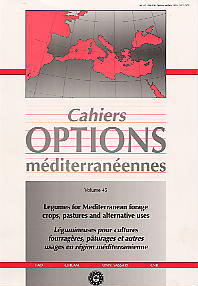| Article précédent | p. 181-185 | Article suivant |
Alfalfa production irrigated with treated effluent in Canary Islands
The aim of this work was to study agronomic effects of wastewater on the soil and on forage yields when irrigated using secondary effluent. We present the results obtained in 1998 per 99, although the experiment started in 1995. The experimental field was located in northeast Gran Canaria island, Spain. Climate has 243 mm per year of precipitation and an annual temperature average of 19.5 degrees C). Soil has 3 dS per m of total dissolved salts and 13.7 of Sodium Adsorption Ratio (SAR). We tested four alfalfa varieties (Gilboa, Giulia, Hunterfield and a Spaniard ecotype: Aragón). The experimental field was divided in two zones, respectively irrigated with reclaimed water (T1) and fresh water (T2). Each zone was subdivided in two blocks with all the varieties seeded randomly three times per block, each one with a 10 m2 surface. There were no fertilization programs and the harvest is handmade.
- [ Afficher ]
- [ Télécharger ]
- [ Exporter la citation ]
Vous pouvez télécharger la citation au format :
- [ Imprimer ]
-
Mots-clés
EAU USEE, ESPAGNE, LUZERNE, MEDICAGO SATIVA, PATURAGES, PLANTE FOURRAGERE, QUALITE DE L'EAUCiter cet article
Palacios M.P., Pardo A., Del-Nero E., Rodríguez F. Alfalfa production irrigated with treated effluent in Canary Islands. In : Sulas L. (ed.). Legumes for Mediterranean forage crops, pastures and alternative uses . Zaragoza : CIHEAM, 2000. p. 181-185. (Cahiers Options Méditerranéennes; n. 45). 10. Meeting of the Mediterranean Sub-Network of the FAO-CIHEAM Inter-Regional Cooperative Research and Development Network on Pastures and Fodder Crops, 2000/04/04-09, Sassari (Italy). http://om.ciheam.org/om/pdf/c45/00600192.pdf



